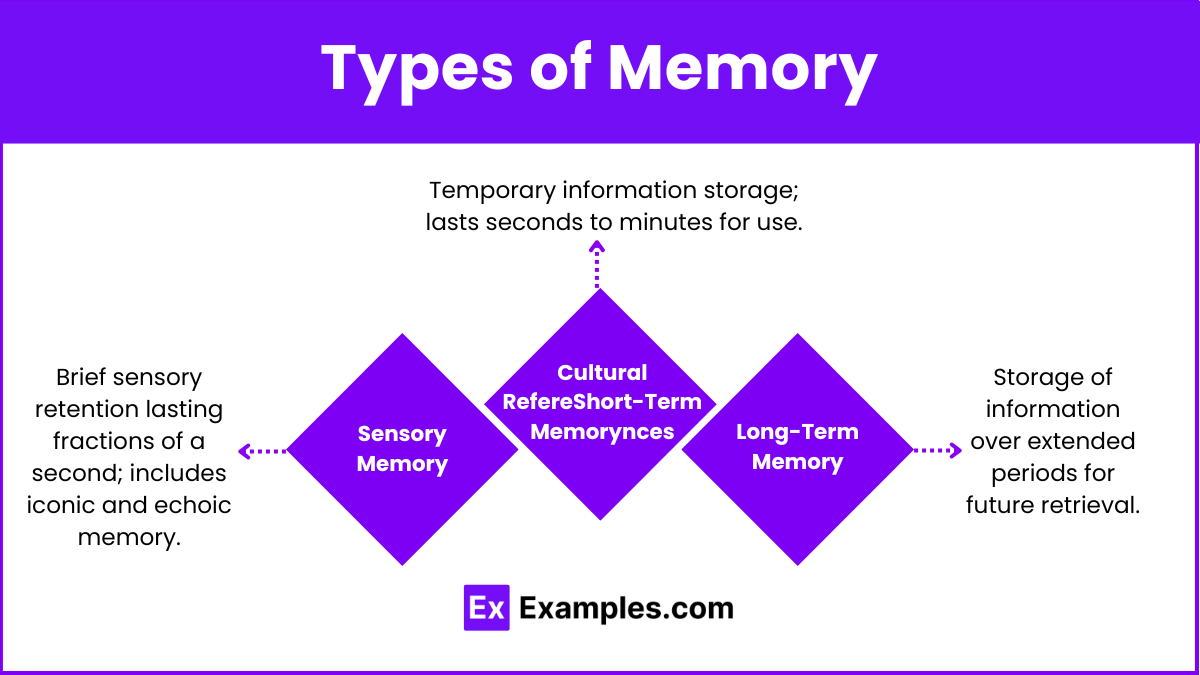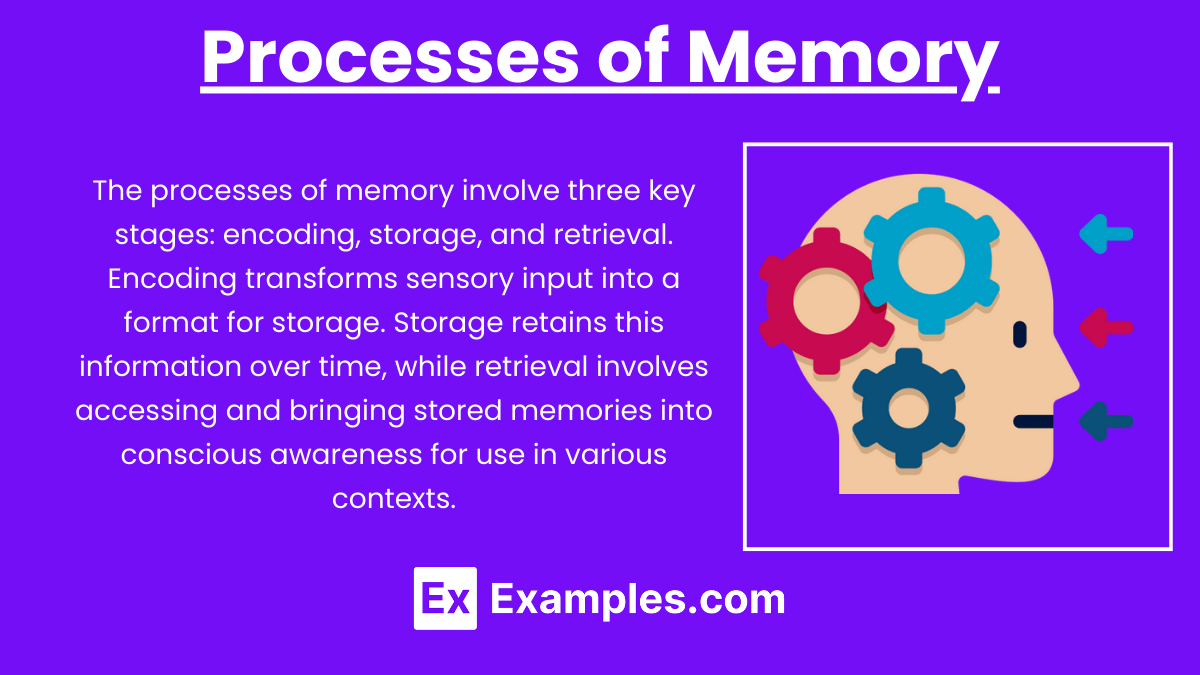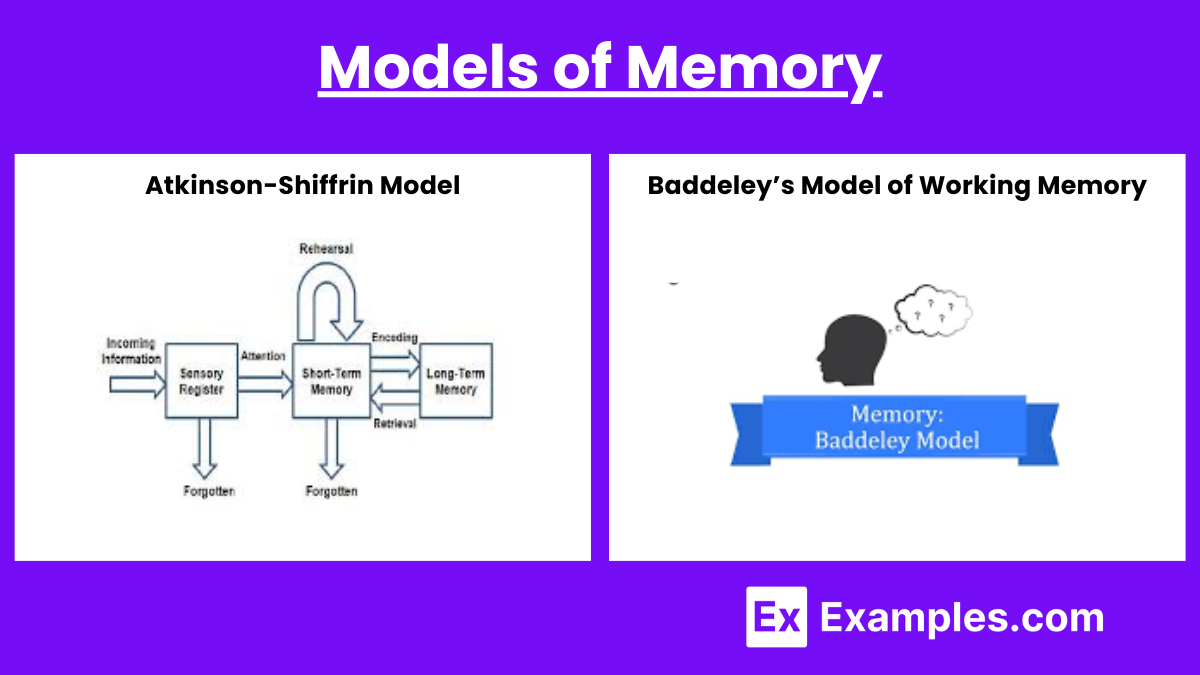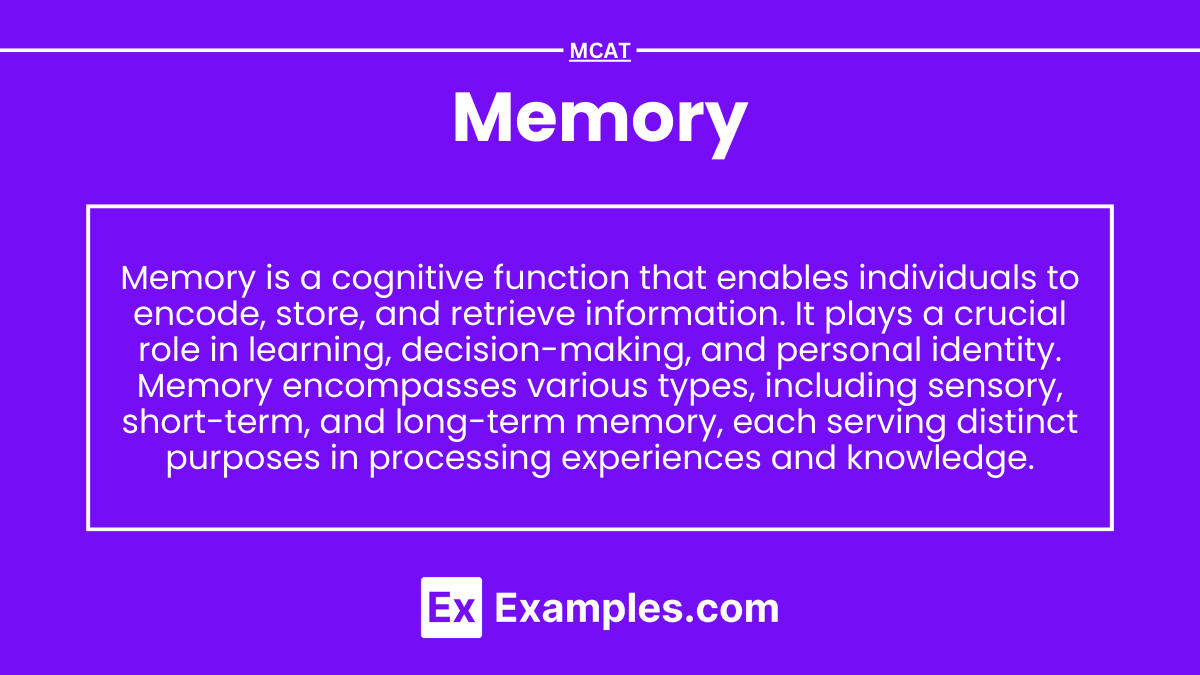Memory

- Notes
Preparing for the MCAT necessitates a profound comprehension of memory, essential for mastering Organ Systems. Understanding the mechanisms of action in memory retrieval and encoding, as well as the functions of various memory types, equips you with crucial insights into cognitive processes, vital for excelling on the MCAT and understanding complex neural functions.
Learning Objective
Understanding memory is crucial for success in the MCAT. This involves recognizing the different types of memory, such as short-term and long-term, and their functions. Additionally, grasping memory processes, including encoding, storage, and retrieval, will enhance your ability to apply these concepts effectively during the exam.
1. Memory

- Memory is the mental capacity to encode, store, and retrieve information. It plays a crucial role in learning and influences our ability to perform everyday tasks.
2. Types of Memory

- Sensory Memory: Brief retention of sensory information. Lasts for a fraction of a second. Includes iconic (visual) and echoic (auditory) memory.
- Short-Term Memory (STM): Temporarily holds a limited amount of information (about 7±2 items) for a short duration (15-30 seconds). Often involves rehearsal to maintain information.
- Long-Term Memory (LTM): Information is stored for extended periods, potentially for a lifetime. It can be divided into:
- Explicit Memory (Declarative):
- Episodic Memory: Personal experiences and specific events (e.g., a birthday).
- Semantic Memory: General knowledge and facts (e.g., capital cities).
- Implicit Memory (Non-declarative):
- Procedural Memory: Skills and tasks (e.g., riding a bike).
- Priming: Previous exposure influences response to a stimulus.
- Explicit Memory (Declarative):
3. Processes of Memory

- Encoding: The initial learning of information, which can be automatic (e.g., recognizing a face) or effortful (e.g., studying for an exam). Techniques to improve encoding include:
- Chunking
- Mnemonics
- Visualization
- Storage: Maintaining information over time. Involves:
- Consolidation: The process of stabilizing a memory trace after initial acquisition.
- Long-term potentiation: A biological mechanism thought to underpin memory consolidation.
- Retrieval: The process of recalling stored information. Can be enhanced by:
- Cues: Stimuli that help access memories.
- Recognition vs. Recall: Recognition involves identifying information (e.g., multiple-choice questions), while recall requires producing it from memory (e.g., essay questions).
4. Models of Memory

- Atkinson-Shiffrin Model: Suggests three stages of memory: sensory memory, short-term memory, and long-term memory.
- Baddeley’s Model of Working Memory: Expands on short-term memory, introducing components like the phonological loop, visuospatial sketchpad, and central executive.
Examples
Example 1: Types of Memory
Memory can be categorized into several types, including short-term, long-term, and working memory. Short-term memory holds a limited amount of information for a brief period, while long-term memory stores information over extended durations. Working memory involves the manipulation of information for cognitive tasks, such as problem-solving.
Example 2: The Process of Encoding
Encoding is the first step in the memory formation process. It involves converting sensory input into a form that can be stored in the brain. For example, when you read a textbook, your brain encodes the information by associating it with existing knowledge, making it easier to recall later.
Example 3: Retrieval Cues in Memory
Retrieval cues are stimuli that help trigger the recall of stored information. For instance, seeing an old photograph might prompt memories of the event captured in the photo. The effectiveness of retrieval cues is linked to the strength of the original encoding process.
Example 4: The Role of Sleep in Memory Consolidation
Sleep plays a crucial role in memory consolidation, the process by which short-term memories are transformed into long-term ones. Research shows that adequate sleep enhances the retention of information learned, as it allows the brain to organize and strengthen neural connections formed during the day.
Example 5: The Impact of Stress on Memory
High levels of stress can negatively affect memory function. Chronic stress can impair the hippocampus, a brain region essential for forming new memories, leading to difficulties in learning and recalling information. Managing stress is vital for maintaining healthy cognitive function.
Practice Questions
Question 1:
Which type of memory is primarily involved in holding information temporarily for immediate use?
A) Long-Term Memory
B) Short-Term Memory
C) Semantic Memory
D) Procedural Memory
Answer: B) Short-Term Memory
Explanation: Short-term memory holds information for a brief period, allowing for immediate use and manipulation. It has a limited capacity compared to long-term memory.
Question 2:
What is the primary function of retrieval cues in the context of memory?
A) To encode new information
B) To strengthen synaptic connections
C) To trigger the recall of stored memories
D) To facilitate the formation of short-term memory
Answer: C) To trigger the recall of stored memories
Explanation: Retrieval cues serve as stimuli that help access and recall previously stored information, enhancing memory retrieval.
Question 3:
Which factor is known to enhance memory consolidation during sleep?
A) Increased levels of cortisol
B) Sleep deprivation
C) Slow-wave sleep
D) Extended periods of wakefulness
Answer: C) Slow-wave sleep
Explanation: Slow-wave sleep is crucial for memory consolidation, as it helps strengthen neural connections and promotes the transfer of information from short-term to long-term memory.
Preparing for the MCAT necessitates a profound comprehension of memory, essential for mastering Organ Systems. Understanding the mechanisms of action in memory retrieval and encoding, as well as the functions of various memory types, equips you with crucial insights into cognitive processes, vital for excelling on the MCAT and understanding complex neural functions.
Learning Objective
Understanding memory is crucial for success in the MCAT. This involves recognizing the different types of memory, such as short-term and long-term, and their functions. Additionally, grasping memory processes, including encoding, storage, and retrieval, will enhance your ability to apply these concepts effectively during the exam.
1. Memory

Memory is the mental capacity to encode, store, and retrieve information. It plays a crucial role in learning and influences our ability to perform everyday tasks.
2. Types of Memory

Sensory Memory: Brief retention of sensory information. Lasts for a fraction of a second. Includes iconic (visual) and echoic (auditory) memory.
Short-Term Memory (STM): Temporarily holds a limited amount of information (about 7±2 items) for a short duration (15-30 seconds). Often involves rehearsal to maintain information.
Long-Term Memory (LTM): Information is stored for extended periods, potentially for a lifetime. It can be divided into:
Explicit Memory (Declarative):
Episodic Memory: Personal experiences and specific events (e.g., a birthday).
Semantic Memory: General knowledge and facts (e.g., capital cities).
Implicit Memory (Non-declarative):
Procedural Memory: Skills and tasks (e.g., riding a bike).
Priming: Previous exposure influences response to a stimulus.
3. Processes of Memory

Encoding: The initial learning of information, which can be automatic (e.g., recognizing a face) or effortful (e.g., studying for an exam). Techniques to improve encoding include:
Chunking
Mnemonics
Visualization
Storage: Maintaining information over time. Involves:
Consolidation: The process of stabilizing a memory trace after initial acquisition.
Long-term potentiation: A biological mechanism thought to underpin memory consolidation.
Retrieval: The process of recalling stored information. Can be enhanced by:
Cues: Stimuli that help access memories.
Recognition vs. Recall: Recognition involves identifying information (e.g., multiple-choice questions), while recall requires producing it from memory (e.g., essay questions).
4. Models of Memory

Atkinson-Shiffrin Model: Suggests three stages of memory: sensory memory, short-term memory, and long-term memory.
Baddeley’s Model of Working Memory: Expands on short-term memory, introducing components like the phonological loop, visuospatial sketchpad, and central executive.
Examples
Example 1: Types of Memory
Memory can be categorized into several types, including short-term, long-term, and working memory. Short-term memory holds a limited amount of information for a brief period, while long-term memory stores information over extended durations. Working memory involves the manipulation of information for cognitive tasks, such as problem-solving.
Example 2: The Process of Encoding
Encoding is the first step in the memory formation process. It involves converting sensory input into a form that can be stored in the brain. For example, when you read a textbook, your brain encodes the information by associating it with existing knowledge, making it easier to recall later.
Example 3: Retrieval Cues in Memory
Retrieval cues are stimuli that help trigger the recall of stored information. For instance, seeing an old photograph might prompt memories of the event captured in the photo. The effectiveness of retrieval cues is linked to the strength of the original encoding process.
Example 4: The Role of Sleep in Memory Consolidation
Sleep plays a crucial role in memory consolidation, the process by which short-term memories are transformed into long-term ones. Research shows that adequate sleep enhances the retention of information learned, as it allows the brain to organize and strengthen neural connections formed during the day.
Example 5: The Impact of Stress on Memory
High levels of stress can negatively affect memory function. Chronic stress can impair the hippocampus, a brain region essential for forming new memories, leading to difficulties in learning and recalling information. Managing stress is vital for maintaining healthy cognitive function.
Practice Questions
Question 1:
Which type of memory is primarily involved in holding information temporarily for immediate use?
A) Long-Term Memory
B) Short-Term Memory
C) Semantic Memory
D) Procedural Memory
Answer: B) Short-Term Memory
Explanation: Short-term memory holds information for a brief period, allowing for immediate use and manipulation. It has a limited capacity compared to long-term memory.
Question 2:
What is the primary function of retrieval cues in the context of memory?
A) To encode new information
B) To strengthen synaptic connections
C) To trigger the recall of stored memories
D) To facilitate the formation of short-term memory
Answer: C) To trigger the recall of stored memories
Explanation: Retrieval cues serve as stimuli that help access and recall previously stored information, enhancing memory retrieval.
Question 3:
Which factor is known to enhance memory consolidation during sleep?
A) Increased levels of cortisol
B) Sleep deprivation
C) Slow-wave sleep
D) Extended periods of wakefulness
Answer: C) Slow-wave sleep
Explanation: Slow-wave sleep is crucial for memory consolidation, as it helps strengthen neural connections and promotes the transfer of information from short-term to long-term memory.

